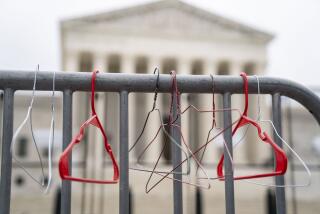Judicial Confirmation Logjam Must Be Broken
- Share via
President Clinton’s selection of former U.S. Rep. Norman Y. Mineta to become the next secretary of Commerce--and the first Asian Pacific American to serve in the Cabinet--is a thrilling moment for the Asian Pacific American community. Fortunately, Sen. John McCain (R-Ariz.), chairman of the Commerce Committee, promised to move the nomination “expeditiously.”
If only other Asian Pacific American nominees were so lucky--particularly those facing the Senate Judiciary Committee, chaired by Orrin Hatch (R-Utah). Bill Lann Lee’s nomination to be assistant attorney general for civil rights has been stalled for three years; for the past 2 1/2 years, he has occupied the post in an acting capacity.
Dolly Gee, nominated to the federal court in the Central District of California, would be the first Chinese American woman to serve on the federal bench. She has been waiting more than a year and still has not received a hearing on her nomination. The Senate has confirmed at least 25 judges who were nominated after Gee. None of those confirmed has been Asian Pacific American. More recently, four federal District Court nominees who were nominated as late as June had hearings scheduled for July. Disturbingly, two of those nominees--white males--were nominated on the same day as John Lim, a Korean American nominated to the Hawaii federal District Court. Lim, like Gee, has yet to receive a hearing.
And then there is Norman Bay, who was nominated in May to be U.S. attorney for New Mexico. If confirmed, Bay would be the only Asian Pacific American among the 93 U.S. attorneys. No hearing on his nomination is in sight.
The last Asian Pacific American judge to make it through the Senate Judiciary Committee--Susan Oki Mollway, now serving as a District Court judge in Hawaii--took 2 1/2 years to be confirmed.
Because this is a presidential election year, the confirmation process is likely to halt soon. No one questions the qualifications of these individuals to serve in the positions for which they have been nominated, so why are their nominations stalled?
Take Gee as an example. If confirmed, she would be only the seventh Asian Pacific American judge currently serving. Considering Asian Pacific Americans make up about 4% of the American population, the lack of Asian Pacific American representation on the federal judiciary--less than 1%--is appalling.
Gee is not a controversial choice. She is principally a labor and employment lawyer who has represented both management and labor. As an arbitrator or mediator, she has helped to resolve hundreds of disputes. Clinton has urged action by the Senate Judiciary Committee, as have California’s Democratic Sens. Barbara Boxer and Dianne Feinstein, U.S. Rep. Xavier Becerra (D-Los Angeles) and U.S. Delegate Robert A. Underwood (D-Guam). Typically, such actions result in movement by the committee. But for whatever reason, Gee’s nomination is being treated as atypical.
Gee’s support is not limited to Democrats. Among others, U.S. Rep. James E. Rogan (R-Glendale), one of the House impeachment managers, has written in support of her nomination. The chief judge of the court where she would be serving--already short-staffed, with four vacancies--also has written urging the committee to take action.
As long as the Senate refuses to consider Gee, justice will not be served. Justice will not be served for citizens who will be deprived of a fine jurist and will face ever-increasing delays caused by a backlog of cases. Justice also will not be served to the Asian Pacific American community, which is underrepresented in the judiciary. Over the past year, numerous groups have accused Republicans of treating minority judicial candidates unfairly. Acting on Gee’s nomination would be a simple yet significant demonstration that Congress is willing to act in the interests of justice during an election year.
More to Read
Get the L.A. Times Politics newsletter
Deeply reported insights into legislation, politics and policy from Sacramento, Washington and beyond. In your inbox twice per week.
You may occasionally receive promotional content from the Los Angeles Times.










